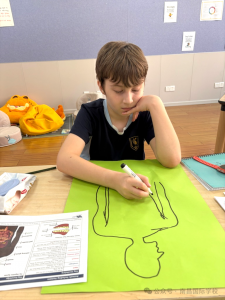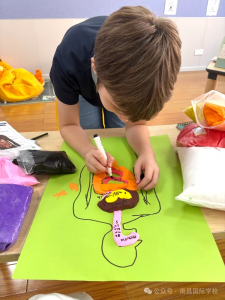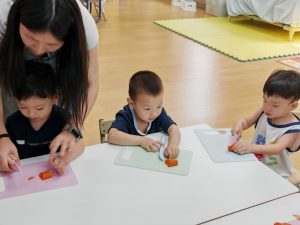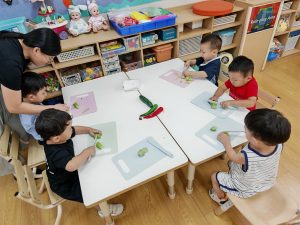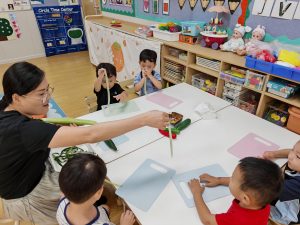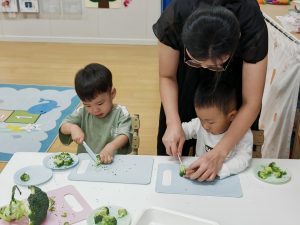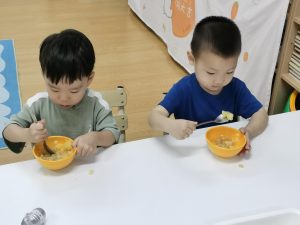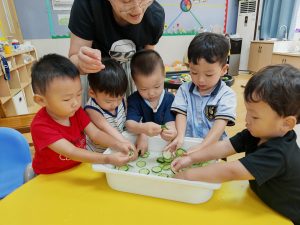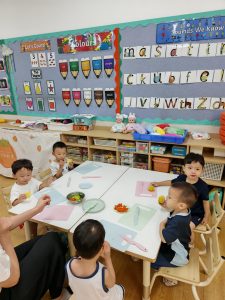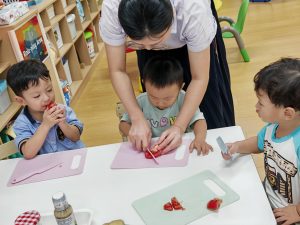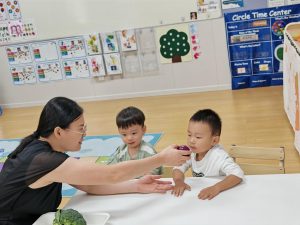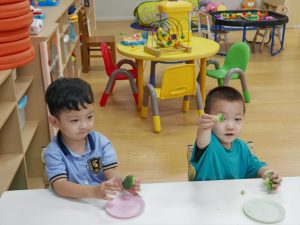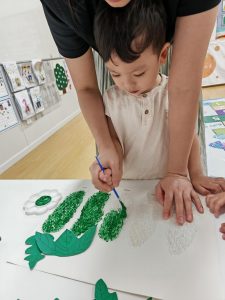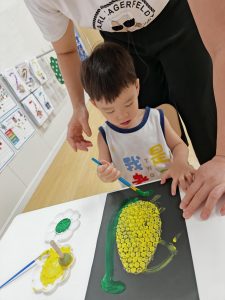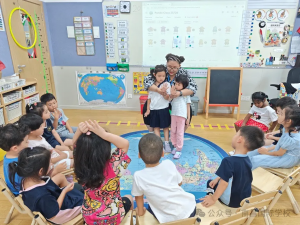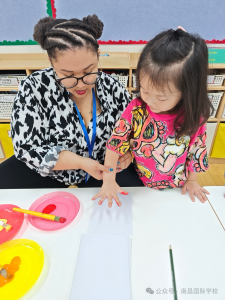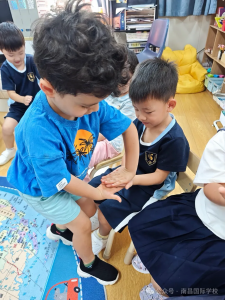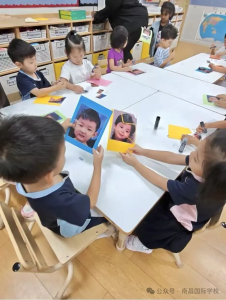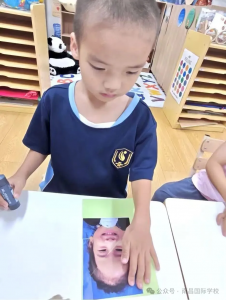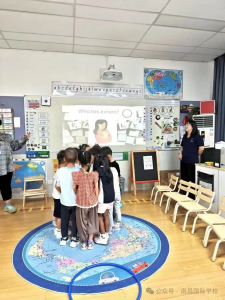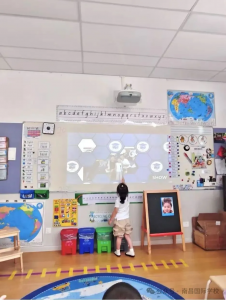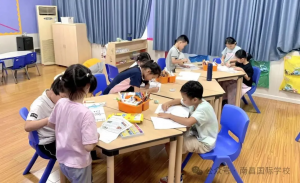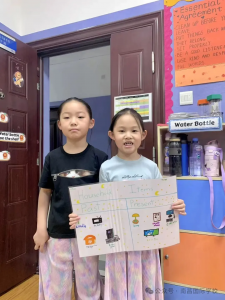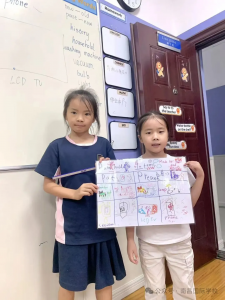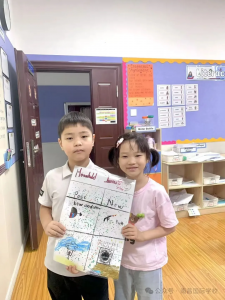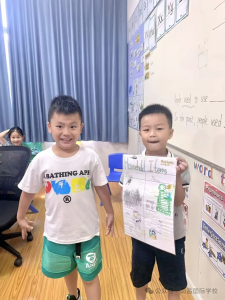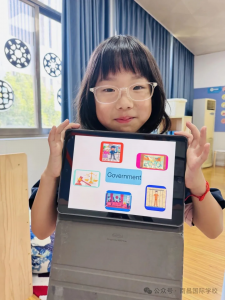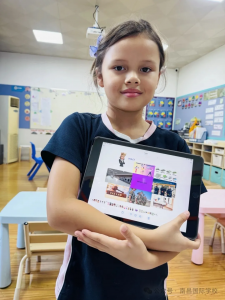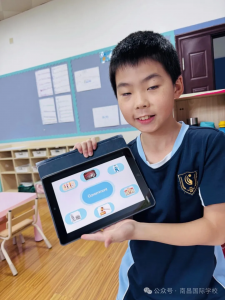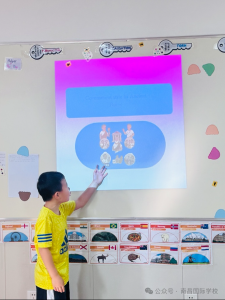Pre-Nursery (Bunny Class)
Explores the World of Vegetables (UOI)
本周,小小班的孩子们参与了一堂关于蔬菜的生动实践课。他们观察了各种蔬菜,讨论其颜色、形状和口感,并通过黏土与绘画表达了自己最喜爱的蔬菜。通过扮演”小厨师”的角色游戏,孩子们体验了”洗菜、切菜、煮菜”的过程,加深了对食物制备的理解。课堂还融入了蔬菜主题的儿歌学习,在欢唱中巩固新知。
This week, pre-nursery children enjoyed a hands-on lesson about vegetables. They observed different vegetables, discussing their colors, shapes, and tastes, and then expressed their favorites through clay and paint. Through role-playing as chefs, they “washed,” “cut,” and “cooked” vegetables, gaining a deeper understanding of food preparation. The children also learned songs about vegetables, reinforcing their new knowledge.
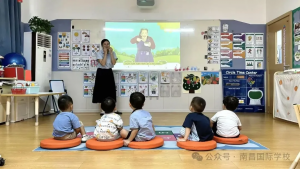
这场互动式体验不仅激发了孩子们对自然的好奇心,更强调了珍惜食物和保持健康饮食的重要性——这些与IB课程注重探究意识和全球视野的教育理念高度契合。
Nursery (Butterfly Class)
Exploring Numbers: A Journey of Discovery (MATH)
本周数学课上,孩子们通过动态的实践探索活动,在主动学习中培养数感。他们通过动物图片进行点数计数,将数量与数字符号配对,锻炼观察力和数字识别能力。借助磁力棒与圆片操作,孩子们通过将数字与对应数量建立联系,进一步发展了逻辑推理能力。
This week in mathematics class, children engaged in a dynamic, hands-on exploration of numbers, building their number sense through active learning. Using animal pictures, they counted and matched quantities to numerical symbols, fostering observation and numerical recognition. Through the use of magnetic rods and discs, they further developed their reasoning skills by linking numbers with corresponding quantities.
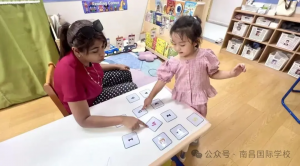
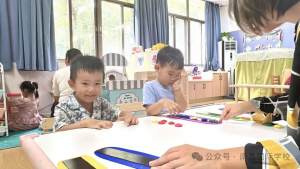
在IB教育理念引导下,这些活动将数学概念与真实生活场景相结合,让孩子自然地构建数学理解。这种教学方式将数学从抽象符号转变为充满乐趣的意义探索之旅,不仅激发了学习兴趣,更为终身学习奠定了坚实基础。
Guided by the IB philosophy, these activities connected mathematical concepts to real-life contexts, allowing children to naturally construct their understanding of math. This approach transforms mathematics from abstract symbols into an enjoyable and meaningful journey, nurturing curiosity and laying the foundation for lifelong learning.
Pre-k (Panda Class)
Embracing Similarities and Differences (UOI)
本周,熊猫班的孩子们共同探索了个性与联结之美。他们通过创作班级手印树,观察到每个人独特的手印如何汇聚成集体的精彩。在拼图游戏中,孩子们用印有自己照片的拼图进行挑战,通过观察眼眸色彩与发丝纹理等细节,学会欣赏彼此的异同。
随后开展的”家庭照片猜猜看”活动中,孩子们通过辨认照片中的亲属特征,展开关于家族相似性与亲缘关系的趣味讨论。通过互动游戏,学生们了解到班级中多样的家庭结构——从兄弟姐妹的数量到家庭组成方式,认识到每个家庭的独特性。
这些活动引导孩子们既能自信地展现自我独特性,也懂得珍视与他人的情感联结。熊猫班的孩子们领悟到:正是那些让我们不同的特质,让我们更好地相聚在一起,从而培养了相互欣赏、团结共融的班级氛围。
These activities encouraged the children to celebrate what makes them unique while also valuing the connections they share with others. Panda Class learned that our differences are what bring us closer together, fostering a sense of unity and appreciation for one another.
Kindergarten (Koala Class)
“My Healthy Plate” (UOI)
本周,考拉班的孩子们通过探讨”健康餐盘”的构成,开启了对均衡饮食的探索之旅。小朋友们学习了五大食物类别——水果、蔬菜谷物、蛋白质和乳制品,并了解了每一类食物如何为全面营养的饮食贡献力量。这场讨论让孩子们认识到膳食多样性与均衡搭配的重要性。
This week in Koala Class, students explored the concept of a balanced diet through a discussion on the components of a healthy plate. The children learned about the five essential food groups—fruits, vegetables, grains, proteins, and dairy—and how each one contributes to maintaining a well-rounded and nutritious diet. This conversation sparked an understanding of the importance of variety and balance in our meals.
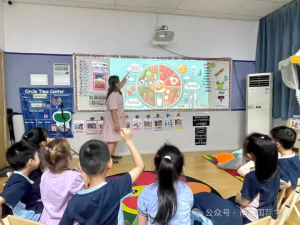
在理论学习之后,孩子们通过制作专属健康餐盘深化认知。他们仔细挑选各类食物图片,用剪刀裁剪后精心排列在纸质餐盘上。这场动手实践不仅巩固了营养学知识,更在剪刀与胶水的使用中激发了创造力,锻炼了手部精细动作能力。
Following the discussion, students took their learning a step further by creating their own healthy plates. They carefully selected and cut out images of food from each group and arranged them on paper plates. This hands-on activity not only reinforced their understanding of nutrition but also encouraged creativity and the development of fine motor skills as they worked with scissors and glue.
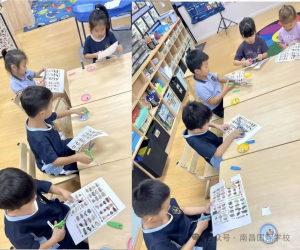
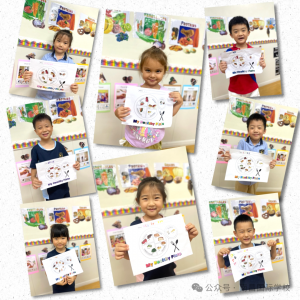
通过这场寓教于乐的活动,小考拉们既加深了对健康饮食的理解,又在充满趣味的实践中掌握了重要技能。
Through this engaging and interactive activity, the Koalas deepened their knowledge of healthy eating while practicing essential skills in a fun, meaningful way.
First Grade (Tiger Class)
Tigers Take Charge: A Hands-On Journey to Healthy Habits (UOI)
过去一周,我们老虎班的小朋友们围绕”均衡生活”单元深入探究了个人卫生知识。课程伊始,孩子们通过研究自制的每日作息时间表,认识到睡眠、学习、游戏与自我护理需要保持平衡才能维持健康。一段短视频生动展示了细菌作为微小生物可能导致疾病的特性,由此师生共同确立了黄金准则:”细菌不可共享”。
Over the past week our Tigers have taken a deep dive into personal hygiene as part of the “Balanced Life” unit. We opened by examining the daily-routine timelines each child had made, discussing how time for sleep, learning, play and self-care must stay in balance to keep us healthy. A short video introduced the idea that germs are microscopic organisms that can cause illness, and we agreed on the golden rule: “Germs are not for sharing.”
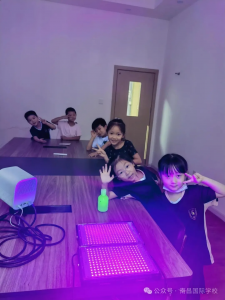
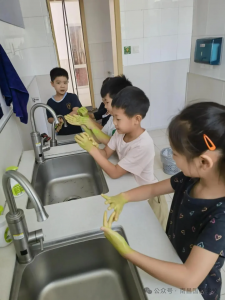
第二天,我们重读绘本《细菌不是用来分享的》,并进行了荧光涂料实验:学生们手上涂满模拟”细菌”的荧光颜料,第一次清水冲洗后观察到残留的顽固色块,第二次使用肥皂搓洗后颜料与模拟细菌彻底消失,直观证明了正确使用肥皂的清洁效力。第三天从实验验证迈向专业操作。孩子们在工作单上为”湿手-涂抹-搓洗-冲净-擦干”洗手步骤排序,并用英语大声宣读每个环节,直至所有学生都能自信地演示整套流程。
On day two we revisited the picture book “Germs Are Not for Sharing” and then conducted a neon-paint experiment: students coated their hands in fluorescent “germs,” washed once without soap, and examined the stubborn patches that remained. A second wash with soap made the paint—and the pretend germs—disappear, proving the power of proper lathering. Day three moved from experiment to expertise. Children sequenced “wet-soap-scrub-rinse-dry” cards on a worksheet and practiced announcing each step in English until every student could teach the routine confidently.
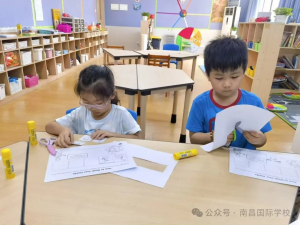
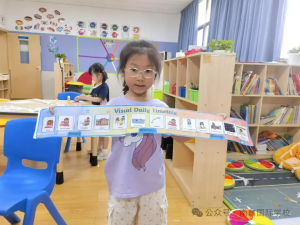
最后在第四天,学生们为在家录制的洗手视频配上了英文解说。这些成品视频即将分享至整个学习社区,通过学生自创的可靠指南,传播有效隔绝细菌的健康实践。
Finally, on day four the Tigers added English voice-overs to the hand-washing videos they had filmed at home. The finished clips are now ready to be exported and shared with the entire learning community, spreading reliable, student-made guidance on staying germ-free.
Second Grade (Lion Class)
Exploring Change: Understanding the Past and Present (UOI)
本周的单元探究中,我们首先通过分类活动探索古今家居用品。孩子们两两合作,对比不同时代的住宅与物品,热烈讨论生活的演变历程。随后大家制作对比图表,使用iPad查询相关信息——展现出日益熟练的技术应用能力。
合作精神贯穿整个学习过程:我们既分工协作又交流想法,实践高效沟通。本节课还解锁了新技能——为作品进行塑封处理,这份动手操作的乐趣为学习注入全新活力。
Collaboration was key as we divided tasks, shared ideas, and communicated effectively. We also learned a new skill—laminating our work—adding an exciting hands-on element to the lesson.
通过此次活动,孩子们在探究往昔家庭生活方式的同时,深化了对”变迁”的理解,完美诠释了”勇于尝试”与”积极探究”的学习者特质。这场穿越时空的探索不仅激发了好奇心,更为持续的历史变迁研究奠定了坚实基础。
Through this activity, we deepened our understanding of change, embracing the roles of risk-takers and inquirers as we explored how families lived in the past. This experience has sparked curiosity and laid the foundation for our ongoing exploration of historical change.
Third and Fourth Grade (Bear Class)
Exploring Government Through Digital Tools
在信息技术课上,学生们开展了一场富有创意的政府主题探索——他们运用数字工具与在线平台设计”思维气泡”,生动呈现对治理理念的理解。通过科技与学习的融合,抽象的政治概念变得具体可感:学生们以可视化方式清晰阐述了对政府的定义。
这场实践活动不仅深化了学生对政府职能的理解,更彰显了数字工具强化沟通与表达的强大效能。在此过程中,学生们既提升了数字素养关键技能,又培养了探究精神与批判性思维。本次活动完美诠释了技术如何成为学习探索的优质媒介:既能促进自我表达,又能助力复杂思想的深入探索。
This hands-on activity not only deepened their understanding of the role and function of government but also highlighted the power of digital tools in enhancing communication and expression. Through this process, students developed essential skills in digital literacy while fostering their inquiry and critical thinking abilities. The activity beautifully demonstrated how technology can be a powerful medium for learning, self-expression, and the exploration of complex ideas.
Sixth Grade (Dragon Class)
Exploration of the Digestive System (UOI)
本周,在”我们是谁”探究单元中,Kosta以充满热情和创造力的方式主导了自己的学习之旅。他从对飞机的热爱出发,积极探索其与生物系统的关联——通过研究并演示飞机工作原理,生动建立了跨学科联系。
This week, Kosta took ownership of his learning in the “Who We Are” unit by diving into the digestive system with enthusiasm and creativity. He began by linking his passion for airplanes to biological systems, researching and presenting how airplanes work, which sparked deeper connections.
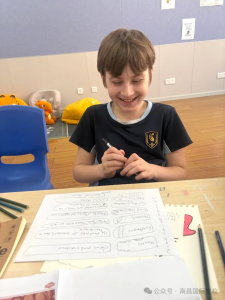
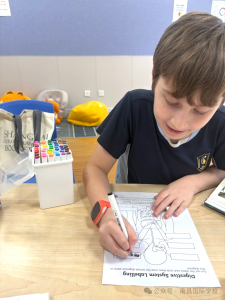
随后他通过趣味词汇搜索巩固知识,制作了清晰有趣的消化系统海报。最精彩的是,他用黏土构建了消化系统的立体模型,将创意与实践性学习完美融合。
He then reinforced his understanding through a vocabulary hunt, creating a clear and engaging digestive system poster. The highlight of his week was building a 3D clay model of the digestive system, combining creativity with hands-on learning.
